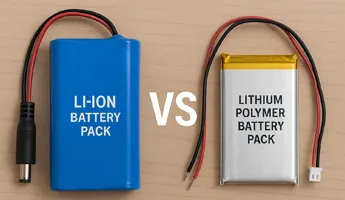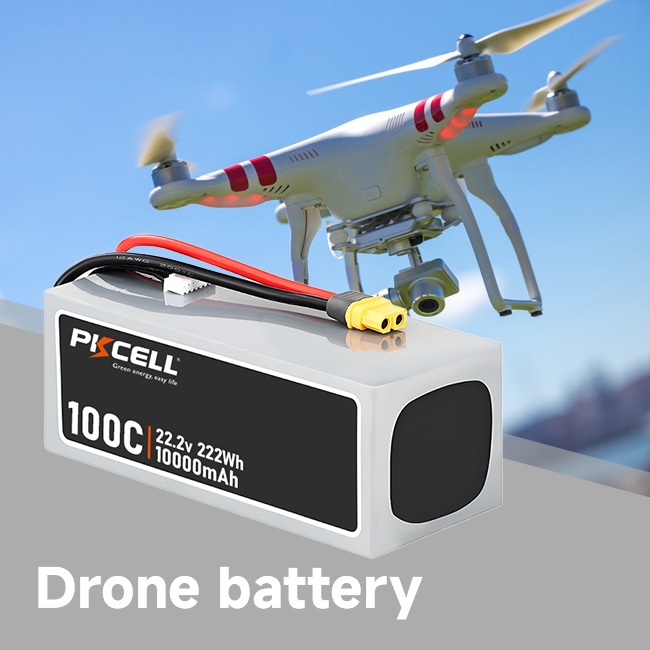
Introducción
Cordless power tools have changed how we work. They are lightweight and easy to use. A battery is an essential part of power tools. It affects their power, how long they last, and how well they work. This guide will discuss everything you need to know about power tool batteries. We will cover the different kinds, how to choose the best one, how to care for them, and more. By the end, you will be ready to make a smart choice when buying a power tools battery that suits your needs.
What Are Power Tool Batteries?
Power tools are important for professionals and people who enjoy DIY projects. They help us do tasks like drilling, cutting, or sanding more quickly and easily. However, these tools require a strong power source to function well. That’s why batteries for power tools are so important.
A battery for power tools is a rechargeable battery. It powers cordless tools like drills, saws, grinders, and impact drivers. You don’t have to plug these batteries into an outlet. This means you can move freely without getting caught by power cords. Power tool batteries make it easier and more efficient to use these tools. They are also lightweight so that you can carry them easily. This gives you more mobility and convenience.
Choosing the right battery for your power tools is very important. A good battery helps your tools run longer and reduces how often you need to recharge. A quality battery also improves the performance of your tools, making them work better. A bad battery can cause fitting issues, damage your tool, and even create safety problems. By selecting the best batteries for your power tools, everything operates smoothly, and both the battery and the tool last longer.

Understanding Common Power Tools Battery Types
Batteries for power tools come in different kinds. Each kind has its own advantages and disadvantages. Let’s look at the usual types of available power tool batteries.
1. Nickel-Cadmium (NiCd) Batteries
NiCd batteries are one of the oldest rechargeable batteries used in power tools. Now, newer technologies are taking their place. NiCd batteries are durable and inexpensive, but they have some problems. They struggle with the “memory effect” and do not store as much energy as other battery types.
2. Nickel-Metal Hydride (NiMH) Batteries
Ni-MH batteries are an improved type of Ni-Cd batteries. They balance cost and performance well. However, their lifespan and working performance are not as good as lithium-ion batteries.
3. Lithium-Ion (Li-Ion) Batteries
Lithium-ion batteries are the most common type used for power tools today. They are popular because they hold much energy and last a long time. You can charge them anytime without losing power, as they do not have a “memory effect.” However, they tend to be more expensive upfront.
| Feature | NiCd | NiMH | Li-Ion |
|---|---|---|---|
| Weight | Heavy | Medium | Light |
| Energy Density | Low | Medium | High |
| Memory Effect | Yes | Low | No |
| Self-Discharge | Medium | High | Low |
| Lifespan | Long | Medium | Best |
| Cost | Low | Medium | High |
| Maintenance Requirements | Regular full discharges are recommended. | Regular full discharges are recommended. | Low maintenance. |
| Eco-Friendly | No | Yes | Yes |
| Recommended Tasks | Light and medium duty tasks | Light-duty tasks | Light, medium and heavy-duty tasks |
How to Choose the Suitable Batteries for Power Tools?
Compatibility with Your Power Tools
Not every battery is compatible with all power tools. Always check your tool’s manual or visit the manufacturer’s website to see if it fits. Using the wrong battery can cause your tool to perform poorly, wear out quickly, or get damaged. Keep these critical points in mind when choosing a battery for your power tool:
- Chemical Type: Most power tools use lithium-ion batteries. Some may need Ni-Cd or Ni-MH batteries instead. Always check to make sure you have the right type for your tool.
- Tensión (V): A higher voltage gives you more power. The common voltages are 4V, 12V, 18V, and 20V. You can find the correct voltage by looking at an old battery or checking the tool manual.
- The most typical voltage in power tools is 18V.
- Batteries between 3.6V and 12V are usually for lightweight tools. This includes cordless screwdrivers and small cordless drill drivers. They are great for daily tasks around the house.
- Batteries that range from 14.4V to 36V are used for stronger tools. This covers cordless hammer drill drivers, cordless angle grinders, and cordless circular saws.
- Capacity (Ah or Wh): A battery with a higher capacity will last longer, but it may feel heavier and cost more.
- Size & Weight: Bigger batteries often last longer. However, they can make the tool feel bulkier and more difficult to manage.

Other Personal Factors to Consider
- Intended Use: Consider how often you use your power tools and how challenging your jobs are. If you work frequently, it’s best to go for lithium-ion batteries. For regular and tough tasks, choose batteries with a higher capacity (Ah) and charge faster. If you only use your tools now and then or for lighter work, standard-capacity batteries should be fine.
- Durability and Lifespan: Consider where you will be using the batteries. If you work in harsh conditions, pick batteries that are strong and can deal with extreme weather. These batteries usually have tough casings that can take a hit and have built-in protections against overcharging, overheating, and short circuits.
- Charging Time: A battery that charges quickly will help get your tools running sooner, reducing your waiting time.
- Budget & Cost: It’s key to compare prices and quality. Lithium-ion batteries might cost more initially, but they usually provide better long-term benefits. Some brands may offer discounts for buying several at once or flexible order numbers.
- Brand & Quality: Always choose trusted brands to ensure safety and durability. Reliable companies like Pkcellsolution.com offer high-quality custom batteries for power tools. They help boost performance and last longer.
Is It Necessary to Use an Original Battery?
Many power tool companies suggest using their own brand batteries. These power tool batteries are designed specifically for their tools. However, they can be costly and hard to locate. That is why some users choose third-party or custom batteries. These choices can provide good performance at a more affordable price.
Custom power tool batteries from companies like Pkcellsolution.com offer several benefits. They are designed to meet the specific needs of your tools. This ensures better compatibility and helps them last longer. Custom batteries also improve safety, reliability, and performance. Whether you are a professional or someone who likes to do it yourself, a good custom battery for your power tools can make you more efficient and improve your work experience.
Best Practices for Safe Power Tool Battery Use

Storage and Disposal
- Keep batteries for power tools in a dry, cool place.
- Avoid exposing them to direct sunlight, extreme temperatures, or moisture.
- Keep them away from flammable materials to avoid fire hazards.
- Prevent metal objects like keys or coins from touching battery terminals to avoid short circuits.
- Store power tools battery away from children and pets for safety.
- Dispose batteries properly—never throw them in the trash or burn them. Instead, take them to certified battery recycling centers.
Proper Charging Practices
- Always follow the manufacturer’s charging instructions.
- Always use the correct charger for your battery type to prevent overcharging or damaging the battery.
- Avoid overcharging, unplug once fully charged to avoid overheating.
- Allow the power tools battery to cool down before recharging after heavy use.
- Charge regularly. Aim to charge the battery at least once a month, even if not in use.
- Avoid draining the battery completely before recharging. Recharge when it reaches 20-30%.
- Charge in a well-ventilated area to prevent heat buildup. Do not charge in extreme temperatures.
- Never charge a damaged or swollen power tool battery.
How to Maximize Battery Life?
- Follow the manufacturer’s recommendations for use and maintenance.
- Avoid turning your power tool on and off frequently, as this may degrade the performance of the power tool battery.
- Avoid extreme heat and cold—do not leave batteries and tools in hot cars or freezing areas.
- Charge slowly when possible, as fast charging may shorten power tool battery life over time.
- Rotate between multiple batteries if you have extras to prevent excessive wear on a single one.
- Regularly use the power tools battery. Leaving it unused for long periods can reduce performance.
- When storing batteries, keep them partially charged (approximately 50-70%) to extend storage life.
- Keep battery terminals clean. Clean battery contacts with a soft, dry cloth to remove dust and dirt.
- Store power tool batteries in a case or insulated bag when not in use.
- Do not drop, hit, or open the power tools battery.
- Inspect batteries regularly for cracks, leaks, or worn-out terminals. If any issues appear, dispose of the battery safely.
Common Battery Issues and Solutions

Over time, power tools batteries may develop problems. Here’s how to identify and fix them:
- Power tool won’t turn on: Ensure the battery for power tools is correctly installed and fully charged. If it still doesn’t work, try a different battery.
- Shorter runtime than usual: Fully discharge and recharge Ni-Cd batteries to reset memory. Clean the battery terminals. The battery may be aging and need replacement.
- Battery does not charge: Check the charger, power outlet, and battery contacts. If the battery is too hot, let it cool before charging. If the issue persists, the battery may be faulty.
- Battery overheating during use or charging: Stop using it immediately and let it cool. Ensure good airflow around the battery. Avoid overloading the tool. If this keeps happening, consider getting a new battery.
- Battery swelling or leaking: STOP using immediately. Dispose of it properly at a battery recycling center.
- Battery indicator shows incorrect readings: Fully charge and discharge the battery to recalibrate. Update or reset smart battery management systems if applicable. If the issue continues, the battery may be worn out.
- Corroded or worn terminals: Clean with a dry cloth or a small brush. Avoid using water or cleaning chemicals. If heavily corroded, replace the battery.
Conclusión
Knowing about power tool batteries will help you use them better. Choosing the right batteries is key for better tool performance and a longer life. You can make the most of your battery investment when you learn about the different types of power tool batteries, how to pick the right ones, and how to take care of them. For custom battery options that fit your power tool needs, look at Pkcell Custom Battery Solution.
Why Choose Pkcell Custom Battery Solution?
PKCELL is a trusted brand in the battery industry, offering high-quality and long-lasting power solutions for various tools. We focus on innovation, durability, and customer satisfaction. Here’s why our custom power tool batteries are a great choice:
- Powerful Performance: PKCELL batteries deliver strong, consistent power for demanding tasks like drilling, cutting, and sanding. You can count on steady performance without interruptions.
- Extended Runtime: Our high-capacity batteries keep your tools running longer, reducing downtime and boosting productivity. You’ll spend more time working and less time recharging.
- Lightweight & Easy to Use: Despite their power, PKCELL batteries remain lightweight and compact, making it easier to handle your tools. Their ergonomic design allows for better comfort and efficiency during use.
- Reliable & Durable: Built to last, PKCELL batteries are designed to withstand impacts, vibrations, and extreme temperatures. Whether you’re working indoors or outdoors, our batteries ensure long-term reliability.
- Fast Charging: With quick charging technology, our batteries recharge in less time so that you can get back to work faster. No more long waits—stay productive and keep your projects on schedule.
- Advanced Safety Features: Your safety is our priority. PKCELL batteries include overcharge, over-discharge, short-circuit, and temperature protection, preventing overheating and extending battery life.
- Custom Battery Solutions: Need a battery tailored to your power tool? We offer customizable options, allowing you to choose the voltage, capacity, and size that best suits your needs.
At PKCELL, we are committed to providing safe, efficient, and high-performance battery solutions. Póngase en contacto con nosotros to find the perfect battery for power tools that fits your needs!

Preguntas frecuentes
What is the average lifespan of a power tool battery?
The life of a power tool battery can change because of several things. These things are the type of battery and how you care for it. Usually, Li-Ion batteries last about 2 to 5 years if you take good care of them. On the other hand, Ni-Cd and Ni-MH batteries usually last around 1 to 3 years. This also depends on how you use and look after them.
How do I know when my battery needs replacement?
There are a few signs that show your battery may need a change. You might notice a significant drop in how long it lasts. It may struggle to keep a charge. The battery could feel very hot when you use it or charge it. Also, look for any damage to the battery casing. If you notice these signs, it could be time to get a new battery.
Can I use different brands of batteries in my power tools?
Yes, but only if they are from trusted brands like Pkcell that follow safety rules. You should also look for compatibility.






